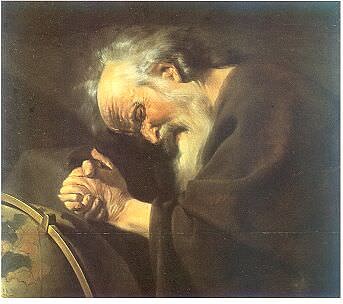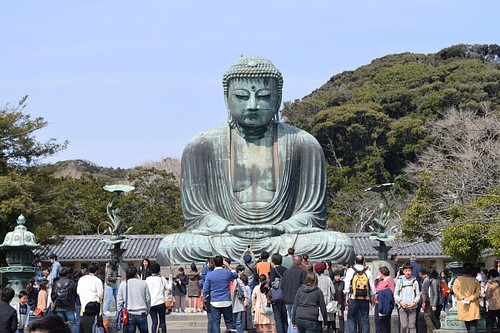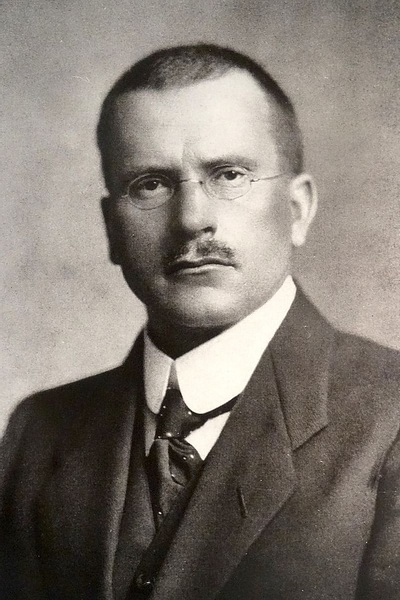Heraclitus of Ephesus (l. c. 500 BCE) famously claimed that “life is flux” and, although he seems to have thought this observation would be clear to all, people have continued to resist change from his time to the present day. Heraclitus was one of the early Pre-Socratic philosophers, so named because they pre-date Socrates, considered the Father of Western Philosophy. The early Pre-Socratics focused on identifying the First Cause of creation – that element or energy that set all of creation in motion and sustained it – and were known as “natural philosophers” because their interest was in natural causes for previously-held supernatural phenomena as explained by the will of the gods.
His Eastern contemporary, Siddhartha Gautama (the Buddha, l. c. 563 - c. 483 BCE), recognized the same essential aspect of life: that nothing was permanent and the observable world was in a constant state of change and understood that this was the cause of human suffering: people insisted on permanence in a world of impermanence. The Buddha encouraged people to accept the essential nature of life and detach themselves from the false idea that anything they held to could be permanent. Heraclitus had the same message but with a significant difference: one could attach one's self to anything, as long as one understood it was fleeting.
The difference between the two philosophers is that Heraclitus encouraged active engagement while Buddha suggested enlightened disinterest. Buddha taught a path of gradual detachment from the mutability of the world leading to the understanding and recognition that one could live one's life fully without craving for what one lacked, fearing what one might lose, or mourning what was past. Heraclitus encouraged people to embrace change as the fundamental essence of life and live in it, even celebrate it, with total awareness of what one had and would inevitably be lost.
Although their central focus differs, their goal is the same: to awaken those who cling to what they know through fear and ignorance and allow for their movement toward a higher, more vibrant understanding of life. Interestingly, though not surprisingly, this same focus would be developed in the 20th century CE by the iconic Swiss psychiatrist Carl Jung (l. 1875-1961 CE) who emphasized the importance of the process of self-actualization – comparable to the state of awareness encouraged by Heraclitus and the Buddha – by which one could let go of childish fears and limitations to live a more mature and fulfilling life.
Heraclitus' Philosophy
Heraclitus seems to have written a number of important works but, of these, only fragments remain preserved by later writers. The early Pre-Socratic interest in identifying the First Cause began with Thales of Miletus (l. c. 585 BCE) and continued on through his student Anaximander (l. c. 610-546 BCE) and then Anaximenes (l. c. 546 BCE), all of whom inspired later philosophers such as Heraclitus.
Thales claimed the First Cause was water because water could assume various states – heated it became air (steam), frozen it became solid (ice), and so on. Anaximander rejected this and claimed the First Cause had to be a cosmic force (which he called the apeiron) far beyond any of the elements of earth, because its essence had to be a part of all of the elements of creation. Anaximenes suggested air as the fundamental element because, like Thales' water, it could assume different forms such as fire (when rarefied), water (through condensation), and maintained life.
All three of these claims recognized change as an essential aspect of the First Cause. Even so, Heraclitus rejected all three as insufficient because, it seems, they lacked an observable, transformative quality; water, the apeiron, and air could initiate transformation but not complete it. He claimed instead that the First Cause was fire – a transformative energy – because all of life, and the very nature of life, was change and transformation embodied and illustrated by the energy of fire. Fire transformed raw meat into cooked food, cool air into warm, wood into ash, darkness to light and so, he claimed, was clearly the First Cause.
Heraclitus is said to have born to an aristocratic family of Ephesus but, whether he actually was, is said to have maintained a superior attitude toward others throughout his life. His philosophy is said to have developed from this attitude as he believed that most people he encountered were beneath him and were, in fact, spiritually and intellectually asleep. It could well be, however, that Heraclitus was simply an astute observer of the human condition and recognized that most people were, in fact, asleep in their lives – as he says - surrendering their own judgments to popular opinion and betraying their dreams in the interests of others. Heraclitus seems to have phrased his philosophy in such a way as to wake people up and force them to confront their own spiritual laziness and emotional lethargy.
It is unclear, owing to his phrasing and the few fragments left of his writing, what his philosophy consisted of outside of the claim that life is constant change, but it seems he advocated for complete awareness of existence in the form of simply paying attention and remaining critical of other people's definitions or declarations of truth. He regularly criticized his fellow philosophers and earlier writers, doubted the opinions of professionals in any area, and believed he understood best how to navigate the path of his own life.
He is probably best known for his oft-misquoted assertion, "You can't step into the same river twice" which is usually directly translated as "In the same river we both step and do not step, we are and are not" (Baird, 20). What Heraclitus meant is that the world is in a constant state of change and, while one may step from the banks into the bed of a river one has walked in before, the waters flowing over one's feet will never be the same waters that flowed even a moment before. In the same way, moment to moment, life is in a constant state of change and, in his view, one can never even count on the certainty of being able to walk into the same room of one's house one moment as one might the next.
Buddha's Philosophy
According to Buddhist tradition, Siddhartha Gautama was a Hindu prince and, shortly after his birth, a sage prophesied that he would grow up to become either a great king or powerful spiritual figure. His father, monarch of the kingdom of Kapilavastu, wanted a successor and so tried to shield his son from any suggestion of human suffering which might incline him toward the spiritual path. The king's plans failed, however, once Siddhartha became aware of sickness, old age, and death. He renounced the throne and embraced the life of a spiritual ascetic, eventually attaining enlightenment and becoming the Buddha.
His enlightened state allowed him to realize, like Heraclitus, that life was flux and that the majority of humanity did not realize this. People suffered constantly, he understood, because they continually insisted on pleasurable aspects of life as permanent states when the nature of these things was fleeting. People wanted to hold on to loved ones, to jobs, to objects, to homes as though they would last forever when there was no way, owing to the nature of these things, that such could ever be. He advocated acceptance of what he called the Four Noble Truths (establishing that life is suffering caused by craving) and a path of detachment – the Eightfold Path – a spiritual discipline which allowed for gradual detachment from the ignorance which held one captive to the illusion of permanence in life.
The significant similarity between the Buddha's philosophy and that of Heraclitus was that Heraclitus advocated no such detachment but intended the same goal. To Heraclitus, one could fully embrace all of the mutable aspects of life and enjoy them fully; just as long as one understood that they were, in fact, ephemeral and could not last. In the same way, Buddha taught his followers that they could enjoy whatever they pleased in life as long as they realized it was ephemeral and without lasting meaning.
Life is Flux
In making his famous statement about the river, Heraclitus was simply illustrating the basic truth that life is constant flux as expressed in his famous phrase Panta Rhei (“everything changes” or “life is flux”). Heraclitus maintained that the very nature of life is change; change is not an aspect of life but life itself and to resist change is to resist life. He also claimed that there was a natural force, associated with transformative fire, which moved all things in rapid succession according to their nature and this was known as the logos.
The logos (Greek for “word”), which infuses all things (but did not create the world nor could bring about its end), operates naturally as 'change', but humans resist this natural flow and, because of this, cause themselves and others to suffer owing to their ignorance of the nature of life. Heraclitus wrote: "To the Logos all things are beautiful and good and just, but men have supposed some things to be unjust, others to be just" (DK 22A32).
In the light of awareness, Heraclitus said, all things were good because all things were natural (a view which would influence the later development of Stoicism, as would the concept of the logos). People were born, lived, and died, and after such a death, their loved ones mourned and called the event a tragedy, but to Heraclitus, it was simply the progression of life and a natural part of the human condition. The grief and strife which accompanied a death were, in his view, part of the natural operation of the logos because he defined conflict and strife as transformative agencies.
Life is Conflict
For Heraclitus, conflict is necessary for the perpetuation of life. Heraclitus criticizes Homer (l. 8th century BCE) who wrote, “would that strife might perish from among gods and men” (Iliad 18.107) because, if that were to be, there would be no opportunity for change and growth. One cannot grow without striving toward some sort of goal, and strife is necessary in this process. Heraclitus, in fact, views conflict as a vital force in maintaining the world:
We must recognize that war is common and strife is justice, and all things happen according to strife and necessity. (DK22B80)
War is the father of all and king of all, who manifested some as gods and some as men, who made some slaves and some freemen. (DK22B53)
Heraclitus rejected Anaximander's concept of the apeiron as a punishing force, creating and destroying, because of the negative connotation of punishment. To Heraclitus, the conflict of opposites is absolutely essential for the continuation of life as understood in the change of the seasons, night turning to day, young people growing old, and even in the living giving way to death. Everything is in constant motion, Heraclitus noted, and one only had to recognize and accept that fact in order to live in it. The Buddha recognized this just as clearly and, in their own ways, both philosophers advocated a compassionate means of accepting and living in a world of constant change when one most desires permanence.
Heraclitus & Jung
Carl Jung echoes the ideas of both philosophers in a number of his works which emphasize the vital importance of accepting change as a transformative possibility. Jung recognized that people feared change because they were afraid of the unknown and that this included a fear of loss and abandonment. In this aspect of his thought, as in others, he drew on the ancient understanding of thinkers like Heraclitus, the Buddha, and many others.
Jung claimed that people feared change, primarily, because they wanted to avoid the kind of conflict associated with growth. In his work The Stages of Life he writes:
Every one of us gladly turns away from his problems; if possible, they must not be mentioned, or, better still, their existence is denied. We wish to make our lives simple, certain, and smooth, and for that reason problems are taboo. We want to have certainties and no doubts - results and no experiments - without even seeing that certainties can arise only through doubt and results only through experiment. (Campbell, 5)
Jung felt that human neuroses arose from the individual's desire to remain childlike and that a part of that was the avoidance of conflict:
Something in us wishes to remain a child, to be unconscious or, at most, conscious only of the ego, to reject everything strange; or else subject it to our will; to do nothing, or else indulge our own craving for pleasure or power. (Campbell, 9-10)
Neither Buddha nor Heraclitus, of course, phrased their concepts in the same way but both seem to have understood well the human tendency to cling to the past and refuse to let go of what one knows and is comfortable with. In doing so, both claimed, one only causes oneself more suffering by refusing to let go of something one was never promised they could hold to begin with.
Conclusion
Buddha and Heraclitus, of course, are hardly the only ancient philosophers to have recognized that life is fleeting and changeable. The brevity of life, in fact, is central to the very concept of philosophy in every culture the world over. It is interesting, however, to consider the views of two of the greatest thinkers of the ancient East and West, along with a modern-day psychiatrist, and recognize the continuity of the human experience.
All three advocate for an acceptance of life as it is while warning against easy answers or comfortable escapes which allow one to avoid suffering without acknowledging its causes. Heraclitus referred to this state as sleepwalking through life, Buddha defined it as underlying ignorance, and Jung identified it as the desire to remain always in a childlike state in which no risks are taken because none are expected. In choosing to remain asleep, ignorant, or childlike, one seeks to resolve the problems of conflict and suffering but, as Jung notes, this choice only stifles the individual:
The serious problems in life are never fully solved. If ever they should appear to be so, it is a sure sign that something has been lost. (Campbell, 11)
What Jung suggests here is a loss of transformative possibilities by clinging to the known instead of letting go and moving forward with the currents of life. As long as one clings to past understandings and personal or cultural traditions of how things must remain, one cannot experience the kind of growth which comes with change and which, in fact, defines all living things as they are moved through the various stages of life with or without their consent. In this, he is simply stating for the modern age what the Buddha and Heraclitus recognized over 2,000 years ago – that life is flux.







